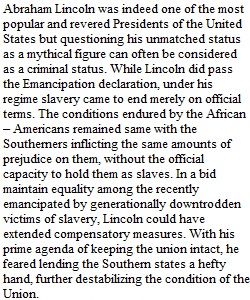


Q Midterm Exams • Points 15 • Submitting a file upload Answer each question with at least 600 words, not including the citations and quotations. Cite your work with the textbook and articles in Canvas. Use multiple sources per response and give a wide variety of examples to support your claim. 1. Is Lincoln deserving of the credit that he is given as being one of the greatest presidents, or was he simply another politician that is given too much credit for the “good” things that transpired during his tenure as president? 2. Examining the history of the United States’ armed forces between 1860 and 1920, was the U.S. military a force for good or evil during this time period? Choose One of the Following 3. For people to discriminate against one another is one thing, but for the government to practice discrimination may be perceived as unconstitutional. What were the many ways that the government discriminated against various groups between 1860 and 1920? What were the proposed solutions to these problems and which solutions would you agree support? 4. Was Laissez-Faire practiced in this country between 1860 and 1920? Why or why not?
View Related Questions